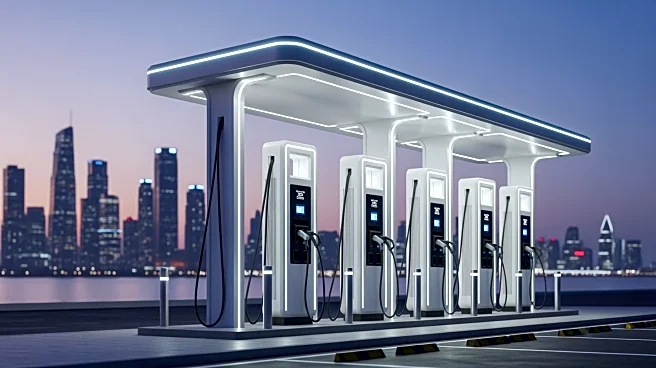What's Happening?
Rivian Automotive Inc. has announced a revision to its 2025 delivery guidance, narrowing the expected range to 41,500-43,500 vehicles. This adjustment comes after the expiration of the U.S. $7,500 EV tax credit for leases on September 30, 2025, which
has created uncertainty in demand. In the third quarter of 2025, Rivian produced 10,720 vehicles and delivered 13,201. Despite achieving its first positive gross profit of $206 million earlier in the year, the company continues to face challenges such as high tariffs on imported components and a high cash burn rate. Rivian's stock has experienced volatility, closing at approximately $13.57 on October 2, 2025, down 7% from the previous day.
Why It's Important?
The adjustment in Rivian's delivery guidance highlights the broader challenges facing the electric vehicle (EV) industry, particularly in the U.S. The expiration of the federal tax credit is expected to dampen consumer demand, affecting not only Rivian but also other automakers. High tariffs on imported parts further complicate the cost structure for EV manufacturers, potentially squeezing margins. Rivian's strategic partnerships, such as the joint venture with Volkswagen, aim to mitigate some of these challenges by sharing development costs and expanding market reach. However, the company's ability to scale production and achieve profitability remains a critical concern for investors.
What's Next?
Rivian is set to release its Q3 financial results on November 4, 2025, which will provide further insights into its financial health and operational progress. Analysts and investors will be closely watching for updates on cost reduction efforts and production efficiencies. The company's ongoing construction of a $1 billion plant in Georgia, expected to create 7,500 jobs and produce next-generation vehicles starting in 2028, is a key part of its long-term strategy. Rivian's execution in the coming months will be crucial in determining its competitive position in the evolving EV market.
Beyond the Headlines
Rivian's situation underscores the complex interplay between government policy, market dynamics, and corporate strategy in the EV sector. The expiration of the tax credit and high tariffs highlight the regulatory challenges that can significantly impact market conditions. Rivian's partnerships and production plans reflect a strategic approach to navigating these challenges, but the company's future success will depend on its ability to adapt to changing market conditions and maintain investor confidence.















